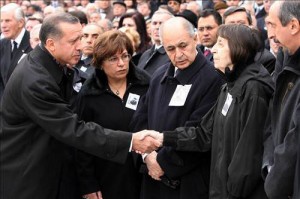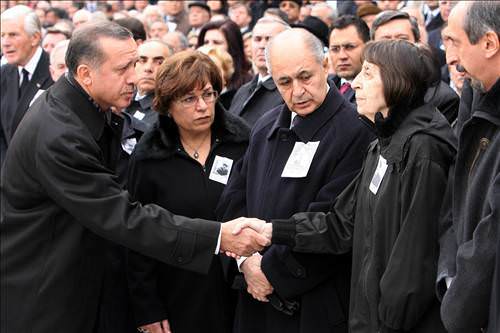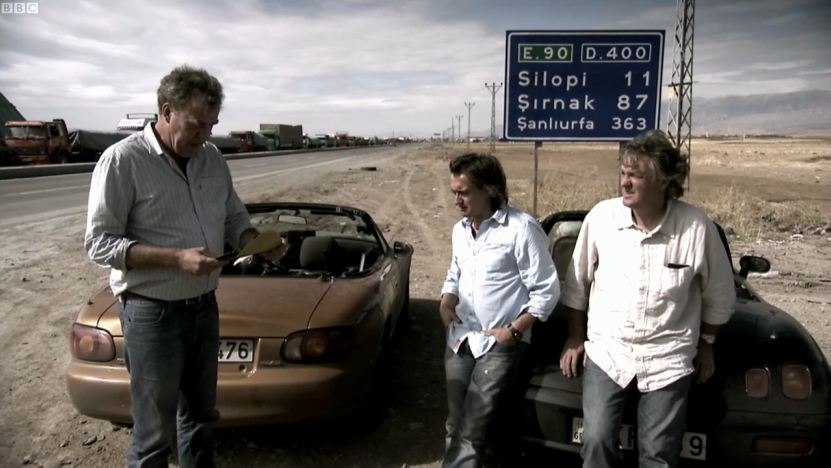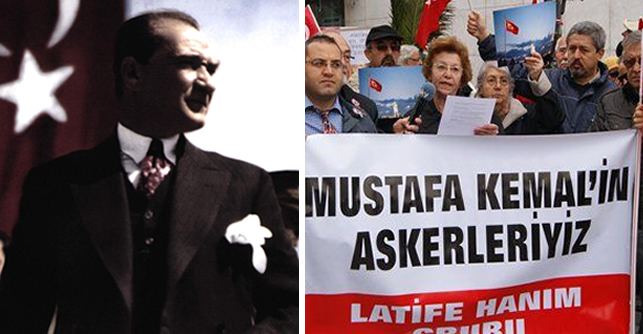
The Prime Minister is jeered at Bülent Ecevit’s funeral, but secularists are wrong to say his end is nigh
Recep Tayyip Erdoğan was visibly annoyed after his party’s general conference yesterday, having spent the morning with a hundred thousand people who really don’t like him.
He was at the funeral of his predecessor, Bülent Ecevit, a man so staunchly secular that when a woman MP dared to enter parliament wearing a headscarf in 1999, television pictures were able to pick up his trademark moustache quivering violently.
“Nobody interferes in a woman’s choice of dress in her private life,” he had thundered from the podium, “but this is no private residence. This is the state’s most supreme institution. Please inform this woman of her limits.”
Mr Erdoğan, conversely, is everything Mr Ecevit was not, and the funeral crowd knew it. “Turkey is secular, it will remain secular” they chanted all day long, occasionally swapping “Turkey” for “The President” to make a dig at Mr Erdoğan’s supposed hopes for the country’s top job. It certainly wasn’t what he wanted to do with his Saturday morning – his party conference was just a few hours later, after all – but as sitting prime minister it was his duty to go.
When he did finally get to the sports hall hosting his party conference, he found no flag-waving crowds cheering his second unopposed election as leader of the AK party; instead, his audience was subdued and miserable. The entertainers failed to impress, and Mr Erdoğan even had to ask the crowd to cheer up and shout a little more. You could be forgiven for thinking it was all part of the funeral.
Clearly, having conference and funeral on the same day was not a good idea. But Mr Erdoğan wasn’t about to shift an already much-delayed party conference, and his efforts to persuade Mrs Ecevit to choose an earlier date proved unsuccessful.
He did respond to the crowd’s slogans (“Are you saying that there is someone behaving outside [the bounds of secularism]?”) and he did try to set his party’s agenda (“We will base our politics on the social centre ground, without repeating history’s mistake of swinging to the fringes”) but it was really the secularism movement in town that stole the front pages.
Given the massive funeral attendance, it is easy to slate the prime minister’s influence, saying the walls are closing in and the AKP is set to lose power in next year’s general election. A hundred thousand is a huge figure, yes, but it is tiny next to Turkey’s population of 70 million. Not all of the country agrees with yesterday’s funeralgoers. It was indeed a bad day for the prime minister, to quote Radikal commentator Murat Yetkin, but it certainly wasn’t his end.
As Mr Yetkin wrote just a few days previously, the AKP remains the only one of Turkey’s four political ideologies to have broken from its past and embraced the new. Mr Erdoğan and his followers separated from the near-extremist politics of Necmettin Erbakan to create a party that campaigned not on a religious platform but one that understood the electorate.
Of the other three ideologies, the centre-left remains bullishly split between Deniz Baykal’s CHP, Murat Karayalçın’s SHP and Mr Ecevit’s former party, the DSP. The centre-right is composed of a True Path Party (DYP) and a Motherland Party (Anavatan) that have spent the last twenty years insisting they are not essentially the same thing, while the extreme right has shown itself to be very good at preaching nationalism, but not so effective in government.
Only the AKP has demonstrated it can put voters before ideology, and the voters have in return made it the largest governing party Turkey has seen since the 1950s. They are likely to do so again next year, if the opinion polls are to be believed.
Yesterday’s funeral was not the beginning of the end for Mr Erdoğan; it was the cry of a political class that is out of touch, but has yet to realise it.








